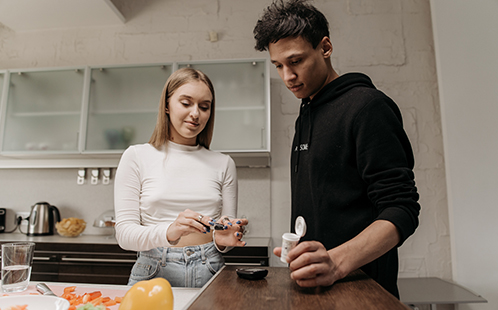
A high percentage of young people living with type 1 or type 2 diabetes in Australia have a mental health condition, affecting their lives, ability to self-manage their diabetes, and increasing the risk of health complications.
To better support the mental health of young people with diabetes, Western Sydney University, together with Maridulu Budyari Gumal (SPHERE) partners, will trial an innovative app assisted “model of care” following a grant of $744,873 from the Australian Government’s Targeted Translation Research Accelerator (TTRA) program, delivered by MTPConnect for the Medical Research Future Fund.
As part of a six-month randomised controlled trial, the researchers will monitor 142 young people using the app developed by Perx Health across eight hospitals in New South Wales and Victoria, assessing its effectiveness in improving mental health, well-being and physical health. The participants will partake in an experience collaboratively created with clinicians, patient advocates and technologists all built on top of Perx Health’s digital platform and integrated into care delivery.
According to project lead Distinguished Professor David Simmons from the University’s School of Medicine and Translational Health Research Institute, the trial is a positive step towards a more accessible, holistic and scalable approach to care.
“Young adults live complicated lives, trying to juggle transitions from school to new work and relationships and the additional burden of diabetes often impacts heavily on their mental health and wellbeing,” said Distinguished Professor Simmons.
“This project supports the growing and critical need to develop a holistic model of care that empowers young adults to self-manage their condition, supports them with the day-to-day pressures of living with diabetes and connects them more readily with their peers and diabetes services when needed.”
The collaborative project, Apps and Peer support for a Healthy Future and Living Well with Diabetes Project, aims to create and test a technology-enabled model of care leveraging peer support using a clinically-validated digital platform.
The program builds on research led by Distinguished Professor Simmons – a global leader in diabetes prevention – exploring the link between mental health and diabetes in young people.
“Our findings show patients with mental health conditions experienced worse glucose levels and higher diabetes-related hospitalisations, providing further evidence for the need to integrate mental health support as part of a robust model of care,” explained Distinguished Professor Simmons.
“Others have found young people are more likely to engage with mental health support if delivered via an app that had additional health-related components.
“These findings have guided a blueprint for the app design which addresses mental health issues and supports diabetes self-care through a combined digital tool.”
The project will include parallel studies that will examine the effect of a technology-enabled model of care in response to short-term distress and its use in regional Indigenous communities.
On completion of the trial, the research team will assess the project’s potential to be expanded, including across additional hospitals and supporting organisations.
Project partners include Western Sydney University; Maridulu Budyari Gumal (SPHERE); South Eastern Sydney Local Health District; South Western Sydney Local Health District; St Vincent Hospital Network Sydney; Sydney Children’s Hospitals Network; Goulburn Valley Health; Perx Health; headspace Liverpool; and Butterfly Foundation.
ENDS
21 October 2022
Ali Sardyga, Senior Media Officer
Photo credit: Pavel Danilyuk via Pexels
Public concerns about high food prices highlight how meeting basic human needs can’t be taken for granted, even in a country like Australia.
The New South Wales Vice-Chancellors’ Committee, the peak body for universities in NSW and the ACT, has initiated a sector-leading approach to introduce a new set of underlying principles for early offer admissions in 2024.
In his memoir’s final chapter, Vince Copley wonders: if the first legal marriage of an Aboriginal woman and a white man had been socially accepted in the 1850s, would his own wife have been spared being pushed to the end of the 1970s bank queue because she was with him, a blackfella?
Mobile options:
Launch your career at UWS